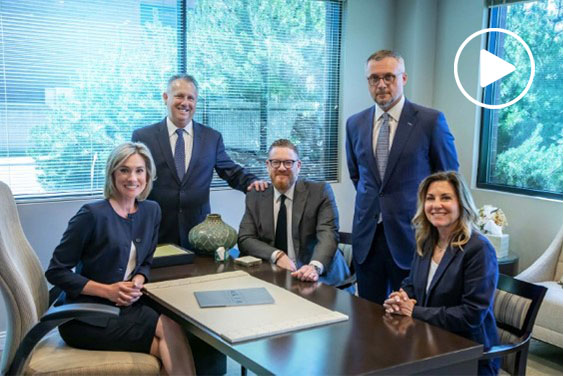Wheaton |
St. Charles |
Sycamore
 630-665-7300
630-665-7300
Downers Grove Divorce Lawyers

This firm has supported me through very difficult family circumstances.
In particular, Lindsay was steadfast in her approach to seek justice for my family and advocate for the wellbeing of my children. She was available, knowledgeable, and compassionate."
Why Clients Trust Us
- Our firm has a 75-year history of excellence
- Our attorneys have over 200 years of combined legal experience
- We have been recognized by Super Lawyers, Elite Lawyer, Best Lawyers, and Avvo
- We have received 200+ 5-star reviews from clients
Attorneys for Property Division, Spousal Support, and Other Divorce-Related Issues in Downers Grove, IL
Attorney Spotlight

Lindsay C. Stella
- Avvo 10.0 Superb Rating Top Family Law Attorneys
- Best Lawyers, 2023 – Present
- Client Satisfaction Award, American Institute of Family Law Attorneys
- Elite Lawyer, 2020-Present
- Illinois Outstanding Young Women Lawyers, Chicago Magazine
- Illinois State Bar Association Family Law Committee Member – 2017
- Justinian Society of Lawyers – President 2018
- Leading Lawyers, Peer Selected, 2023 – Present
- National Academy of Family Law Attorneys, National Top Ten Attorneys Under 40, 2014
- Super Lawyers, 2025-Present
- Super Lawyers Rising Star, 2014-2024
- Top 10 Most Influential Suburban Moms, Glancer Magazine
Contact Us Today
Billing and Fee Structures
We work to ensure that our fees are reasonable and affordable for all of our clients. To discuss our fee structures and learn about payment options, contact us at 630-665-7300.
The breakdown of a marriage may lead to divorce, which will require a couple to completely separate their lives from each other. The legal issues involved in these cases can be complex, and a variety of financial concerns will need to be addressed as well. Working to resolve disputes can be difficult, especially when strong emotions and high levels of conflict have affected a couple's ability to be civil and cooperate with each other. Regardless of the situation, a dedicated divorce lawyer can provide guidance, helping clients make informed decisions as they work to complete the legal process of dissolving their marriage.
At Mirabella, Kincaid, Frederick & Mirabella, LLC, our experienced attorneys work with clients in Downers Grove to address and resolve divorce-related issues. We can assist with every aspect of the divorce process, from filing the initial petition to resolving disputes regarding marital property or child custody. We will work to negotiate settlements when possible or provide representation in contested cases. Our goal is to protect the rights and interests of our clients while finding effective solutions to the legal, financial, and emotional challenges that may arise.
Filing a Petition for Divorce in Illinois
The divorce process begins when one spouse files a Petition for Dissolution of Marriage with the appropriate circuit court. Illinois is a no-fault divorce state, which means that the only grounds required for divorce is "irreconcilable differences," which means that a couple's relationship has broken down to the point where it cannot be repaired. There is no need to prove wrongdoing or state that either spouse is at fault for the breakdown of the marriage.
Once the petition is filed, the other spouse must be formally served with legal notice of the divorce. That spouse will then have the opportunity to file a response. The divorce process may then proceed, and the spouses will work to resolve all outstanding issues that must be addressed for their marriage to be dissolved.
The Discovery Process in Divorce Cases
Discovery is a critical phase in a divorce. It allows each party to gather information from the other in order to ensure that they have a full understanding of financial issues and other relevant details. Discovery may involve:
- Interrogatories: One spouse's attorney may send written questions to the other spouse, asking them to confirm certain details.
- Requests for Production: An attorney may file formal requests to provide documents such as bank statements, tax returns, and real estate records.
- Depositions: Sworn statements may be given by either party, answering questions about different issues related to the couple's finances or other aspects of their marriage.
- Subpoenas: An attorney may file legal orders requiring third parties, such as employers or financial institutions, to provide documents or testify.
Discovery ensures transparency in a divorce. It will help both parties obtain a complete picture of their marital assets, income, debts, and other relevant information that may affect the outcome of their case.
Contested vs. Uncontested Divorce
A divorce may be uncontested when both spouses agree on all outstanding matters. In these cases, the couple may draft a marital settlement agreement, which will be submitted to the court for approval. An uncontested divorce can typically be completed more quickly and with fewer expenses than a divorce that requires litigation.
When spouses disagree on one or more important issues, their divorce may be contested, and litigation may be necessary to resolve any outstanding matters. If a case proceeds to trial, a judge will make final decisions regarding all unresolved matters.
Property Division in an Illinois Divorce
Under Illinois law, divorcing couples will be required to divide their marital property fairly and equitably, and the division does not necessarily have to be equal. It is important to distinguish between marital property, which includes assets and debts that were acquired during a couple's marriage, and non-marital property, which generally includes assets owned before the marriage or acquired through inheritances or gifts.
Types of property that may need to be addressed during a divorce include:
- Real Estate: In addition to addressing ownership of their marital homes, a couple may need to decide how vacation properties or investment properties will be handled.
- Bank Accounts and Investments: Checking and savings accounts, stocks, bonds, mutual funds, and retirement accounts may all need to be addressed. Steps may need to be taken when dividing certain types of accounts or benefits to minimize taxes or penalties
- Business Interests: When one or both spouses own a business or professional practice, they will need to determine how ownership of the business will be handled going forward. A business valuation will usually be necessary to ensure that both spouses understand the value of business assets.
- Personal Property: A couple may need to divide items such as vehicles, furniture, jewelry, and other household property.
- Debts: Mortgages, credit card balances, student loans, and personal loans may need to be addressed, and spouses will need to understand who will be responsible for paying these debts.
Spousal Maintenance
In some situations, a spouse may require financial support following a couple's divorce. Spousal maintenance is meant to provide assistance in cases where a person would be unable to maintain their standard of living on their own. A spouse's eligibility for maintenance may be determined based on several factors, including:
- The length of the marriage
- The income and property of each party
- The standard of living established during the marriage
- The age, health, and earning capacity of both parties
- The contributions one spouse made to the education or career of the other
If spousal support is determined to be appropriate, Illinois law provides statutory guidelines to calculate the amount and duration of payments. Our attorneys can help determine whether alimony may be awarded in a divorce, and we will advocate for arrangements that will protect our client's interests.

Legal Representation in DuPage County
Downers Grove divorce cases will be handled at the DuPage County Courthouse, located at:
- 505 N County Farm Rd., Wheaton, IL 60187
Our attorneys serve clients in DuPage County from our Wheaton office, which is located at:
- 1737 South Naperville Road, Suite 100, Wheaton, IL 60189
What Our Clients Say About Our Family Law Services
- "This law firm is very knowledgeable in all aspects they deal with and I would highly recommend them. Great response time to your concerns or questions and works very hard for their client(s)."
- "There was never a moment where my questions were left unanswered, or I felt in the dark. The amount of effort, care and genuine professionalism was bar none."
- "I cannot recommend [the] team at Mirabella, Kincaid, Frederick & Mirabella, LLC enough ... I am incredibly grateful for their help and professionalism. If you're looking for a family law attorney who will exceed your expectations, [the] team at MKFM are the ones to call."
Child Custody and Parenting Plans
Couples with children will need to address child custody issues during the divorce process. These issues include the allocation of decision-making responsibilities and the creation of parenting time schedules. A divorce decree will include a parenting plan that will outline how issues related to the couple's children will be handled going forward.
Key components of a parenting plan include:
- Decisions about the allocation of major decision-making responsibilities, specifying how parents will make decisions related to education, healthcare, religion, and extracurricular activities
- A detailed schedule that addresses day-to-day parenting time as well as holidays and vacations
- Transportation arrangements, including pickup/drop-off procedures
- Appropriate methods of communication
- Procedures for modifying the parenting plan or resolving future disputes
Post-Divorce Modifications
After a divorce is finalized, a family may experience changes. An ex-spouse may request a modification of certain court orders, such as those concerning parenting time, child support, or spousal maintenance. Modifications may be granted when there is a substantial change in circumstances, such as:
- A significant increase or decrease in income
- The planned relocation of a parent
- Changes in a child's needs or schedules
- Health issues that impact a parent's ability to care for children
To request a modification, a petition must be filed with the court. The burden of proof lies with the person requesting the change. Some modifications may be resolved through mutual agreement, while others may require court hearings. Our lawyers can provide representation to help ensure that modification requests will be handled correctly, and we will advocate for solutions that will meet our client's needs.
Community Involvement
Our team works to give back to our community whenever possible. Our community involvement includes:
- Sponsoring and participating in food drives, clothing donation drives, and many other charitable events through Lawyers Lending a Hand and other charities and organizations.
- Providing financial assistance to our clients' family members through our Giving Back for College Reimbursement Program.
- Providing financial aid to students with divorced parents through our Resilient Student Scholarship.
Frequently Asked Questions About Divorce in Downers Grove
The timeline for a divorce may vary depending on whether the case is contested or uncontested and whether there are complex issues that will need to be addressed. In some cases, an uncontested divorce may be completed in a few months, although more time may be needed to negotiate agreements on certain issues. Contested divorces may take a year or longer before they can be finalized.
Yes, spouses who are not ready to divorce may file for legal separation. They will address many of the same issues that would be covered in a divorce, including child custody or spousal maintenance, and a separation agreement will be created. After a legal separation, a couple will remain legally married. If either spouse wishes to get married to a new partner in the future, they will need to get a divorce.
Mediation is often used to resolve divorce-related disputes outside of court. If you choose to use mediation, you and your spouse will meet with a neutral mediator and negotiate a divorce settlement. You will need to attend a court hearing to file your agreed settlement and complete your divorce.
A spouse will have the opportunity to resume their former name after their divorce has been finalized. Terms allowing for name changes may be included in a divorce decree, but name changes are also allowed under the law. If a person wishes to change their children's last name after a divorce, additional legal procedures will need to be followed.
Contact Our Downers Grove, Illinois Divorce Attorneys
While a divorce may involve multiple types of challenging issues, legal help from an attorney can help ensure that these issues will be addressed correctly. At Mirabella, Kincaid, Frederick & Mirabella, LLC, we can provide guidance on the strategies for success during a divorce, and we will advocate for your interests throughout your case. To learn more about how we can assist you, contact our Downers Grove divorce lawyers at 630-665-7300 and schedule a consultation.












 Read More
Read More





